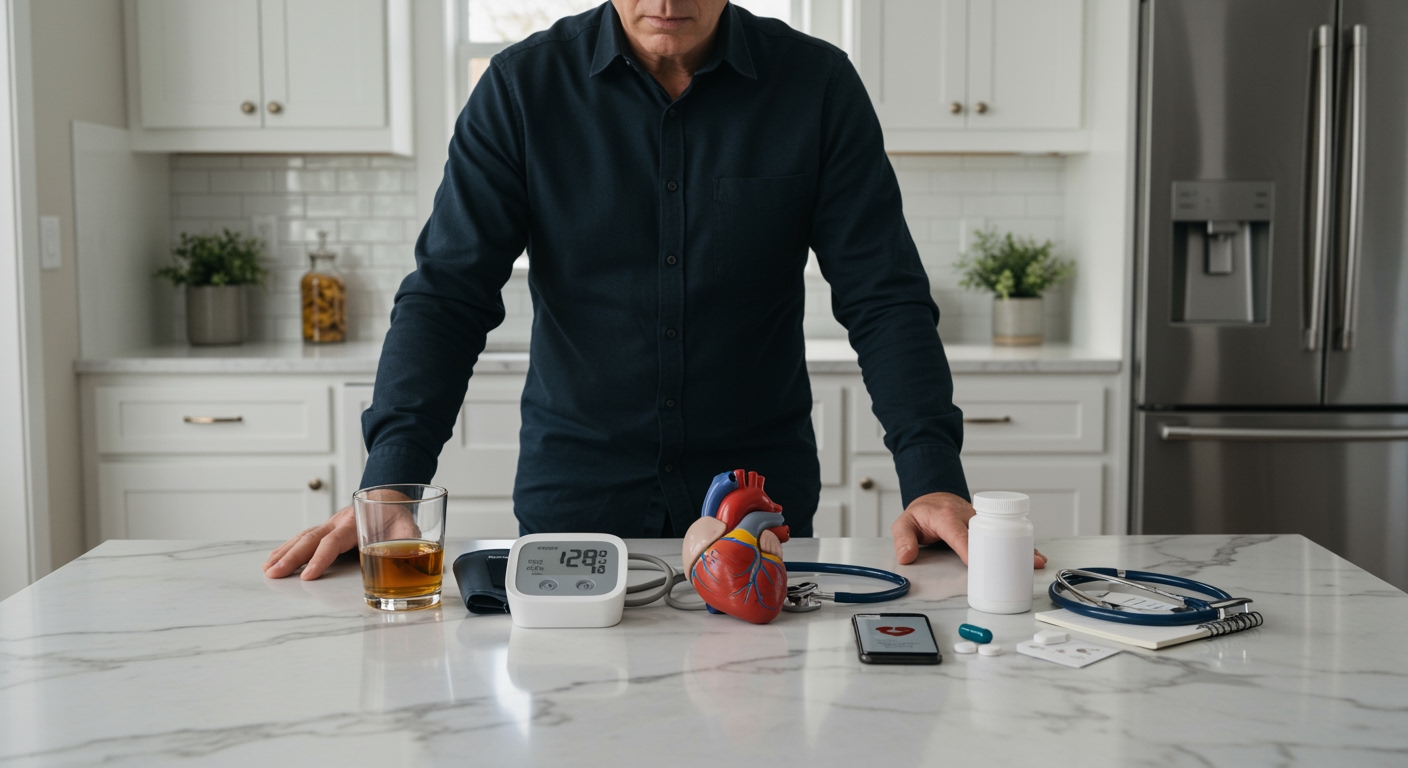✪ Key Takeaway: Alcohol can dangerously lower blood pressure through immediate vasodilation and long-term cardiovascular effects.
Introduction
Your evening glass of wine might be doing more than relaxing your mind.
Many people wonder about alcohol and blood pressure because they notice feeling dizzy or lightheaded after drinking, especially when standing up quickly.
Hi, I’m Abdur, your nutrition coach and today I’m going to explain how alcohol consumption can dangerously lower your blood pressure and what you need to know to protect your health.
How Does Alcohol Immediately Affect Blood Pressure?
Alcohol acts as a vasodilator within minutes of consumption.
This means it causes your blood vessels to widen and relax, which reduces the resistance against blood flow.
When blood vessels dilate, your heart does not need to pump as hard to circulate blood throughout your body.
This immediate effect can drop your systolic pressure by 5-10 mmHg and your diastolic pressure by 3-5 mmHg within the first hour of drinking.
The alcohol also affects your central nervous system, which controls many automatic body functions including heart rate and blood vessel constriction.
Your body interprets this sudden drop in blood pressure as a potential threat, which triggers compensatory mechanisms that can create dangerous fluctuations throughout the night.
✪ Fact: Even one drink can cause measurable blood pressure changes within 30 minutes of consumption.
What Happens During The Rebound Effect?
The most dangerous part comes when alcohol leaves your system.
As your liver processes the alcohol over several hours, your blood vessels begin to constrict again.
This rebound effect often causes blood pressure to spike higher than baseline levels, sometimes reaching dangerous territories.
Your nervous system, which was suppressed by alcohol, becomes hyperactive during this recovery phase.
This creates a rollercoaster effect where your cardiovascular system swings from dangerously low to dangerously high pressure readings.
People with existing heart conditions face the highest risk during this rebound period, which typically occurs 12-24 hours after drinking stops.
Regular drinkers experience more severe rebound effects because their bodies become dependent on alcohol to maintain normal blood vessel function.
✪ Pro Tip: Monitor your blood pressure for 24-48 hours after drinking to catch dangerous rebounds early.
Who Faces The Greatest Risk From Alcohol-Induced Hypotension?
Certain groups face much higher risks from alcohol-related blood pressure drops.
Older adults have naturally declining cardiovascular function, making them more susceptible to dangerous drops.
People taking blood pressure medications face compounded effects because alcohol amplifies the action of these drugs.
Individuals with diabetes often have compromised blood vessel function, which makes alcohol-induced changes more unpredictable and dangerous.
Those with heart conditions, especially heart failure or arrhythmias, cannot handle the stress of rapid blood pressure fluctuations.
Dehydrated people experience more severe drops because alcohol further reduces blood volume through its diuretic effects.
Women generally show greater sensitivity to alcohol-induced blood pressure changes due to differences in body composition and hormone levels.
✪ Note: Always consult your doctor about alcohol consumption if you take any heart or blood pressure medications.
What Are The Warning Signs Of Dangerous Blood Pressure Drops?
Your body sends clear signals when blood pressure drops to dangerous levels.
Dizziness when standing up quickly is often the first warning sign of hypotension.
Feeling lightheaded, weak, or unusually tired after drinking indicates your brain is not receiving adequate blood flow.
Nausea and cold, clammy skin suggest your body is struggling to maintain proper circulation.
Rapid heartbeat occurs as your heart tries to compensate for low blood pressure by pumping faster.
Blurred vision and confusion are serious signs that your brain is not getting enough oxygen-rich blood.
Fainting or near-fainting episodes require immediate medical attention because they indicate critically low blood pressure levels.
✪ Pro Tip: Keep a blood pressure log when drinking to identify your personal danger patterns and thresholds.
How Can You Protect Yourself From Alcohol-Related Blood Pressure Problems?
Smart strategies can help you minimize risks while still enjoying occasional drinks.
Always eat a substantial meal before drinking because food slows alcohol absorption and reduces blood pressure swings.
Stay well-hydrated by drinking water between alcoholic beverages to maintain proper blood volume.
Limit yourself to one drink per hour to give your body time to process alcohol without overwhelming your cardiovascular system.
Avoid standing up quickly after drinking, especially when moving from sitting or lying positions.
Monitor your blood pressure regularly if you drink regularly, keeping a log of readings before and after alcohol consumption.
Consider completely avoiding alcohol if you have heart conditions, take blood pressure medications, or have experienced dangerous drops before.
✪ Fact: Eating protein-rich foods before drinking provides the best protection against dangerous blood pressure drops.
The Bottom Line
Alcohol can indeed lower your blood pressure dangerously through immediate vasodilation and complex rebound effects that stress your cardiovascular system.
Your health is worth more than any temporary pleasure from drinking, and understanding these risks helps you make informed decisions about alcohol consumption.
I would love to hear about your experiences with alcohol and blood pressure changes, or any questions you might have about managing these risks safely in the comments below.
References
At NutritionCrown, we use quality and credible sources to ensure our content is accurate and trustworthy. Below are the sources referenced in creating this article:
- American Heart Association: Routinely drinking alcohol may raise blood pressure
- WebMD: Hypertension and Alcohol
- HSE Ireland: Effects on your body: Blood pressure
- American Heart Association: Limiting alcohol to manage high blood pressure





